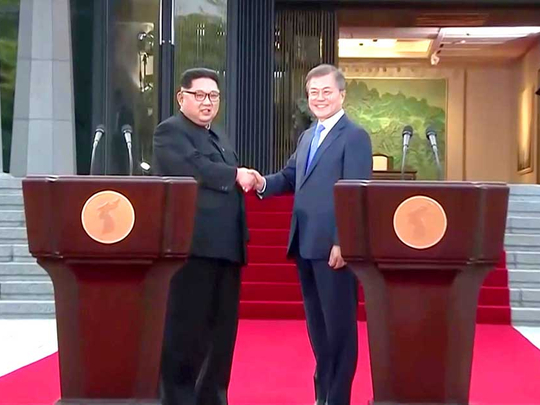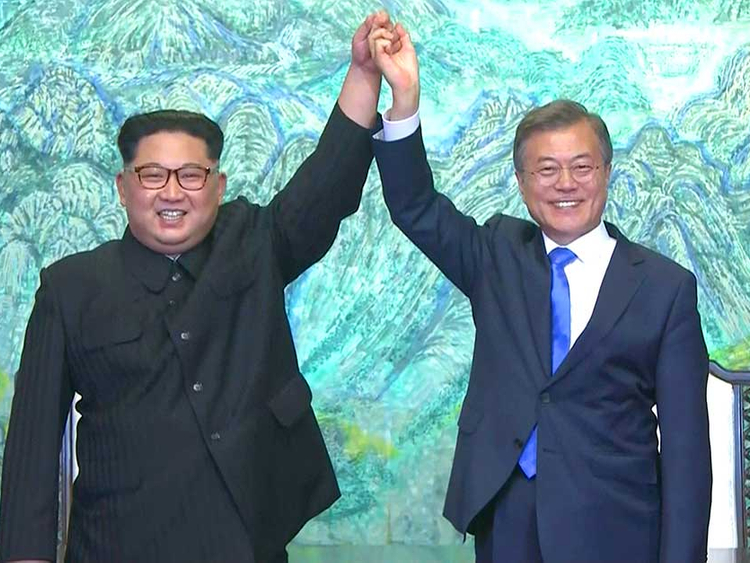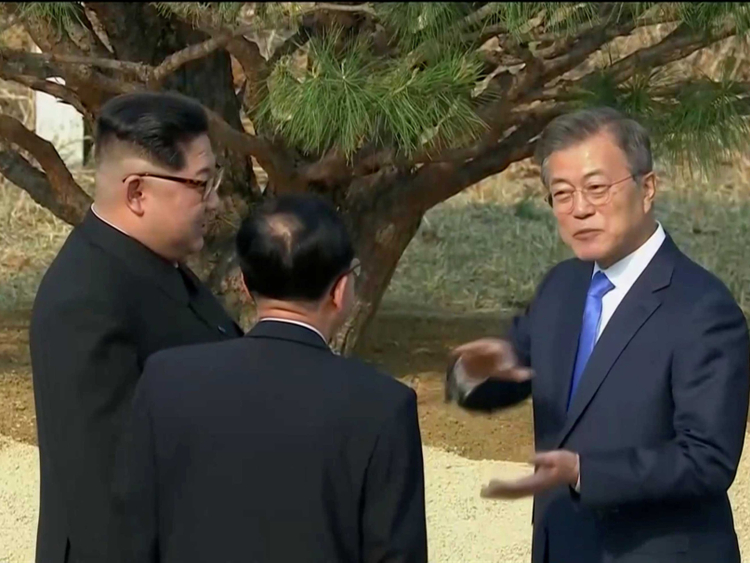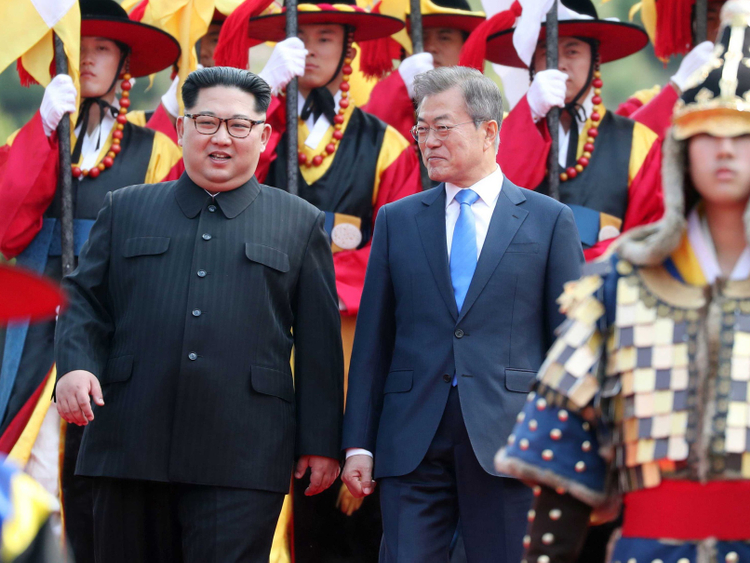
SEOUL: For years, he has been regarded by South Koreans as a ruthless bully, the face of a hostile neighbor intent on developing weapons of mass destruction whose subjects heeded his every whim.
But during a 12-hour visit across the border Friday, North Korean leader Kim Jong Un appeared to soften that image, at least somewhat, by presenting himself as a normal, even likeable fellow with candid, humble side and a quick wit.
North Korea hails its summit with the South as a "historic meeting" that paved the way for the start of a new era, after the two leaders pledge to pursue a permanent peace and rid the peninsula of nuclear weapons https://t.co/4Ulo1cPM0X pic.twitter.com/RLaAuYhepD
— AFP news agency (@AFP) April 28, 2018
It was a rare glimpse into Kim, who has rarely left his country and is normally depicted in the hero-worship language of the North Korean propaganda machine.
But on live TV watched by millions of South Koreans, he smiled warmly, talked, joked and even embraced South Korean President Moon Jae-in during the first inter-Korean summit since 2007.
“I’ve only seen him in media, standing stone-faced in a nuclear site or political event, but actually he seemed quite friendly and respectful when he greeted Moon,” said Lee Soo-kyung, a 34-year-old teacher in Seoul.
Some US officials and experts doubt Kim’s sincerity, and see a recent flurry of North Korean diplomacy as a ploy to win relief from economic sanctions against Pyongyang.
North Korean media hails summit as Trump presses for full denuclearisation
'Turning point'
On Saturday, North Korea's state news agency on Saturday called the inter-Korean summit a "turning point" for the Korean peninsula, while US President Donald Trump said he would maintain sanctions pressure on Pyongyang ahead of his own unprecedented meeting with Kim Jong Un.
The North's KCNA news agency separately released the joint statement North Korean leader Kim Jong Un and South Korean President Moon Jae-in presented on Friday after the first summit in more than a decade between the two Koreas.
Kim and Moon had pledged to work for "complete denuclearisation" of the Korean peninsula and agreed on a common goal of a "nuclear-free" peninsula.
Open-hearted exchange
"At the talks both sides had a candid and open-hearted exchange of views on the matters of mutual concern including the issues of improving the north-south relations, ensuring peace on the Korean Peninsula and the denuclearisation of the peninsula," KCNA said, reporting that the night wrapped up with a dinner with an "amicable atmosphere overflowing with feelings of blood relatives."
A day after the meeting between Kim and Moon produced dramatic images and a sweeping declaration of goodwill, South Korean media were replaying striking scenes of the two leaders and North Korea's main state newspaper published a multi-page spread with photos from the visit.
Most of the specific commitments outlined in the official declaration focused on inter-Korean relations and did not clear up the question of whether Pyongyang is willing to give up its arsenal of nuclear weapons and ballistic missiles.
Broad themes
In their coverage of the summit, North Korean state media made rare mentions of the denuclearisation discussion, but did not go into specifics, instead highlighting the broad themes of peace, prosperity, and Korean unity.
The declaration earned guarded but optimistic praise from world leaders, including Trump, who said that only time would tell, but that he did not think Kim was "playing."
"It's never gone this far. This enthusiasm for them wanting to make a deal ... We are going to hopefully make a deal."
Still, Trump told reporters, he would maintain pressure on North Korea and "not repeat the mistakes of past administrations."
Speaking on Saturday at a televised news conference in Sydney, Australian prime minister Malcolm Turnbull praised Trump's negotiations on North Korea and said he helped bring the two Korean leaders together.
Kim returns to the North
Kim Jong Un has returned to North Korea after a summit with South Korean President Moon Jae-in.
As pop music blared, Kim and Moon firmly grasped each other's hands on Friday during a lavish farewell ceremony at the border truce village of Panmunjom, as photos of their summit were projected onto a massive screen installed in front of the building where they met.
Kim then boarded a black Mercedes Benz limousine that drove them back north.
Denuclearisation
The two Koreas have agreed to rid their peninsula of nuclear weapons but failed to provide any new specific measures how to achieve that.
A joint statement issued after their leaders' talks Friday says the two Koreas confirmed their goal of achieving "a nuclear-free Korean Peninsula through complete denuclearization."
North Korea has placed its nukes up for negotiations. It has previously used the term "denuclearization" to say it can disarm only when the United States withdraws its 28,500 troops in South Korea.
The statement didn't say what other specific disarmament steps North Korea would take.
< More meetings
Kim Jong Un called for more meetings with his South Korean counterpart after becoming the first North Korean leader to cross the border to hold talks over his nuclear weapons program.
VIDEO: Kim Jong Un is being escorted to the inter-Korean summit by a phalanx of bodyguards carefully chosen for their fitness, marksmanship, martial arts skills and even looks pic.twitter.com/rUW4xWGWqE
— AFP news agency (@AFP) April 27, 2018
Kim made the offer to South Korean President Moon Jae-in as the pair met Friday on their militarized boundary for the first summit between the rival governments in 11 years. Both men basked in the symbolism of the moment, with Kim calling for "a new history of peace and prosperity" and Moon saying the "weight on our shoulders is heavy."
#UPDATE Kim and Moon had 'sincere and frank dialogue' on denuclearisation and permanent peace on the Korean peninsula at their historic summit pic.twitter.com/40UaKAxalY
— AFP news agency (@AFP) April 27, 2018
Permanent communication office
North and South Korea have agreed to open a permanent communication office in the North Korean town of Kaesong and resume temporary reunions between relatives separated by the 1950-53 Korean War following a historic summit between their leaders.
North Korean leader Kim Jong Un and South Korean President Moon Jae-in also said after their summit on Friday that the Koreas will seek to expand civilian exchanges and pursue joint sports and cultural events.
Talks with US
North and South Korea say they will jointly push for talks with the United State and also potentially China to officially end the 1950-53 Korean War, which stopped in an armistice and left the Koreas still technically at war.
North Korean leader Kim Jong Un and South Korean President Moon Jae-in announced after their summit on Friday that the Koreas will push for three-way talks including Washington or four-way talks that also include Beijing on converting the armistice into a peace treaty and establishing permanent peace on the Korean Peninsula.
The Koreas said they hope the parties will be able to declare an official end to the war by the end of this year.
While President Donald Trump has given his "blessing" for the Koreas to discuss an end to the war, there can be no real solution without the involvement of Washington and other parties that fought in the war because South Korea wasn't a direct signatory to the armistice that stopped the fighting.
China welcomes move
China has welcomed the summit between its ally North Korea and South Korea, saying it applauds the countries' leaders for taking a "historic step" toward peace.
Foreign Ministry spokeswoman Hua Chunying told reporters at a briefing Friday that Beijing wishes that the meeting between the North's leader Kim Jong Un and South Korean President Moon Jae-in will achieve a "positive result."
UK too welcomes summit
British Foreign Secretary Boris Johnson is welcoming the summit between the two Koreas but says he doesn't expect any great breakthrough that might curb North Korea's nuclear ambitions.
Johnson told reporters at NATO headquarters Friday, "I am very encouraged by what's happening."
He says: "I don't think that anybody looking at the history of North Korea's plans to develop a nuclear weapon would want to be over-optimistic at this point. But it is clearly good news that the two leaders are meeting. Absolutely."
The historic summit of the Koreas hangs on the North's nuclear intentions
North Korean leader Kim Jong Un Friday morning crossed the line that has divided the Korean Peninsula for 65 years, walking into South Korea for a historic summit with President Moon Jae-in that will lay the groundwork for a meeting between Kim and President Donald Trump.
It was the first time since the Korean War ended in 1953 that a North Korean leader has come to South Korea and it was broadcast live across the country, with commuters stopping in train stations and teachers stopping classes so their students could watch the moment.
Kim, wearing his trademark black Mao suit, walked down the steps of the Panmungak building on the northern side of the line that divides the peninsula, and up to the concrete curb that marks the exact line.
Moon was waiting for him there, his hand outstretched. They talked, smiling, for several minutes before Moon invited Kim across to the southern side. Kim accepted but, after posing for photos, invited Moon to cross back into the North with him.
VIDEO: Making history, Kim and Moon shake hands, step in and out of each other's countries and offer hopes of peace for the divided Korean peninsula pic.twitter.com/cP9g1FTwqZ
— AFP news agency (@AFP) April 27, 2018
Moon went and the two Korean leaders stood hand in hand in what is technically North Korea - something that would have been unthinkable even a few months ago.
"This was a very moving moment for all of us," said Paik Hak-soon, a North Korea expert at the pro-engagement Sejong Institute outside Seoul.
"The two Korean leaders, crossing the military demarcation line and making these talks happen, are sending a message to the world that they are initiating peace on the Korean Peninsula," he said.
After crossing the line, Kim entered the Peace House building on the southern side of the border and signed a welcome book with the message: "New history from now on, [we are] at the start of a historic new peace era."
Two North Korean security guards cleaned the chair, guest book and pen with sanitizer before Kim sat down to write the message.
Once inside the meeting room, a relaxed and jovial Kim joked about bringing cold noodles from Pyongyang for Friday night's dinner banquet and, in front of the media, gave conciliatory opening remarks.
"Let's hold hands and walk toward the future," the 34-year-old North Korean leader said, with his younger sister, Kim Yo Jong (above), at his side at the table.
Moon responded in kind.
"We have a whole day to us, so let's talk about the things we haven't been able to talk about for the last 10 years," the South Korean president said. "I want to once again show my respect for Leader Kim Jong Un's courageous decision that made today possible."
The warm welcome, complete with a red carpet and a military honor guard in traditional costume, kicked off a day of talks that will cover inter-Korean relations and setting up a peace regime to bring about a formal end to the Korean War, which ended in an armistice, not a peace treaty.
Those subjects have largely been coordinated in advance, but the real wild card is denuclearization.
Kim is willing to discuss denuclearization
Moon has said that Kim is willing to discuss denuclearization, and without the condition of American troops being withdrawn from South Korea.
Successive US administrations have insisted that Pyongyang give up its nuclear program and allow outside inspectors to verify the progress, the Kim regime has long said that any process must be mutual and accompanied by the withdrawal of the US military from the southern half of the peninsula.
In an announcement Saturday that North Korea would not conduct any more nuclear or missile tests, Kim made no mention of giving up his program. He simply signaled that he would suspend his program.
"The devil will be in the details," said Laura Rosenberger, a fellow at the German Marshall Fund of the United States who worked on North Korea policy in the Obama White House.
She cited the "Leap Day deal" debacle in 2012, when North Korea agreed to a moratorium on missile tests, only to launch what it said was a satellite about six weeks later.
"I worry about that kind of thing happening again," she said.
Outcome of talks
The outcome of these talks will be of huge interest to the United States, which was on the receiving end of Kim's nuclear threats last year.
Trump has tweeted that "big progress" is being made toward denuclearization and that he is looking forward to meeting Kim. That meeting has not been scheduled but is likely to happen in late May or early June. The location has not been decided.
But analysts are much more skeptical about securing the kind of agreement that would lead Kim to give up his nuclear weapons program.
"Expectations for these summits are greatly inflated, which is the last thing you want going in," said Victor Cha, chairman of the Korea department at the Center for Strategic and International Studies in Washington and one of the negotiators of the 2005 denuclearization deal.
Pleased to meet you, let's make history pic.twitter.com/8JX8ZUsj1m
— AFP news agency (@AFP) April 27, 2018
That the summit is happening at all represents an astounding turn of events after a 2017 that was marked by major advances in North Korea's nuclear and missile programs. This sparked a war of words between Kim and Trump that many feared might turn into actual military action.
But Trump's "maximum pressure" policy of tough sanctions and tougher words, combined with Kim's heightened nuclear-powered swagger, has created an environment for talks in which the United States and North Korea each think they have the upper hand.
Moon, who took office only a year ago pledging to engage with North Korea, recognized the opportunity for diplomacy and set the process that led to Friday's summit in motion at the Winter Olympics that South Korea hosted in February.
The summit and the change of mood it has brought about in South Korea, where there were palpable fears of military action at the end of last year, has won wide approval in South Korea.
North Korean leader Kim Jong Un and South Korean President Moon Jae-in take part in the first inter-Korean summit in more than a decade https://t.co/QKVSk5knnu pic.twitter.com/ZjW3yFFUYc
— Reuters Pictures (@reuterspictures) April 27, 2018
Even the conservative newspapers, usually harsh critics of Moon's progressive government, have been cautiously supportive of the effort to embark down a diplomatic path.
The JoongAng Ilbo, one the biggest newspapers, said that the outcome of Friday's summit would have wide-reaching implications.
"Kim must realize this is the last chance for survival," the paper wrote in an editorial Friday. "If Kim tries to attach unrealistic conditions as his predecessors did, he cannot gain anything. That will only help the hawks in Washington bay for stronger action."
This is only the third inter-Korean summit and is the first that South Korea has hosted.
Kim Dae-jung went to Pyongyang in 2000 to meet then-leader Kim Jong Il, the current leader's father, and was awarded the Nobel Peace Prize for his efforts. However, the shine came off when it emerged the South had paid the North $500 million to participate.
Roh Moo-hyun, Kim's successor, followed suit by traveling to Pyongyang in 2007 and meeting Kim Jong Il. At the time, Moon was Roh's chief of staff and head of the summit preparation committee.
Singing in the summit? Korea's musical first ladies
At first glance the two Koreas' first ladies, who are to attend a banquet Friday following a historic summit between their husbands, would appear to have little in common.
One is in her 20s from the isolated North and the other is in her 60s from the capitalist South, but they share a passion for music - both Ri Sol Ju and Kim Jung-sook were professional singers before their marriages.
Ri, the wife of the North's leader Kim Jong Un, has gained a growing political profile, accompanying Kim to key events at home and abroad including last month's summit with Chinese President Xi Jinping - whose wife Peng Liyuan is also a former singer.
Believed to be in her late 20s and having three children with Kim, Ri was already a public figure in her own right as a singer for the Unhasu band - an elite troupe whose members are handpicked by the state based on their talent, looks and loyalty to the regime.
The couple tied the knot in 2009, but Ri was only publicly identified as Kim's wife in 2012 after the young, inexperienced leader inherited power from his father the previous year.
Ri quickly became one of the most high-profile women in the isolated country, joining her husband on numerous "field guidance trips" and for meetings with foreign dignitaries, often dressing in luxury brands and once sporting a Christian Dior handbag.
Her public presence was a departure from precedent in the North, where the wives of the previous two leaders - Kim's father and grandfather - rarely made public appearances, with details about their lives mostly kept secret.
Ri was accorded the description of "respected First Lady" in the North's state media earlier this month - the first time the title had been used in the deeply patriarchal country for more than 40 years.
It came as she made her first solo public appearance, with analysts saying the moves were an effort to paint the North as a "normal state" ahead of Kim's summits with Moon and US President Donald Trump.
Ri will dine with her Southern counterpart Kim Jung-sook, the wife of South Korean President Moon Jae-in.
In the Korean writing system, Kim's name is identical to that of Kim Jong Un's grandmother Kim Jong Suk.
The 63-year-old is also a professionally trained vocalist who was once a member of the Seoul city choir before becoming a housewife shortly after marriage and having two children.
As Moon gained political prominence, Kim endeared herself to the public with her outgoing and cheerful personality - in contrast to her husband, who is often described as too quiet and bland.
She has showed off her singing skills at public events and was seen performing Psy's horse-riding Gangnam Style dance on a visit to the Philippines last year - a break from most previous first ladies who remained quiet and coy next to their husbands.
The couple met at a university in Seoul where Kim was studying classical singing and law student Moon was a pro-democracy activist opposing the then military dictatorship.
Moon says they fell in love when she took care of him after he was left unconscious by a police tear gas canister fired during a campus pro-democracy rally, and she supported him while he served a prison term for his activism.
It was Kim who proposed to Moon - a rarity in the conservative South - in defiance of opposition from her parents, who were unimpressed by his humble background as the son of poor North Korean refugees.















